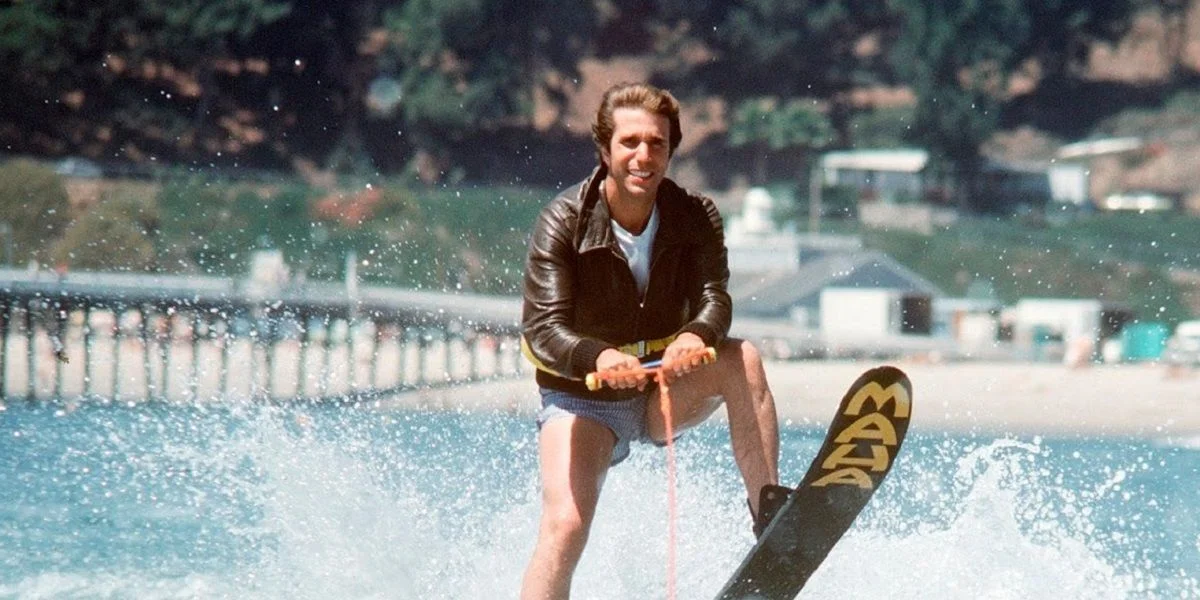Of course he cleared the shark. But why should we care?
Climate change. Healthcare. Terrorism. Fashion week. And…I wonder what’s new on Netflix?
In a time of such profound turmoil, with grave challenges facing so many billions of people, what possible room is there for cultural criticism as a serious discipline? From a distance—and not a very far distance—it seems like the efforts of well-educated folks to simply give their opinions (the most intangible thing possible) about movies or new art exhibitions presents the worst kind of self indulgence, both individually as culturally. No matter how big a hit, the likelihood that any creative work is going to actually improve the measure of someone else’s life is exceedingly small. The act of cultural criticism feels like an irrelevance.
Years ago, when Arthur " The Fonz" Fonzerelli planned a water skiing jump over a shark held captive in a coastal estuary, the culture got a new term for eye-rolling irrelevance. Ironically, culture critics have not stopped talking about the event ever since. (You can look it up.)
But creative criticism does not happen in isolation. It is not a “one off” thing, an act of capriciousness worthy only of diamond-soled elites. Cultural criticism, especially of creative works, becomes ever more vital in times of cultural and political turmoil. Without an astute eye on reflections cast by the creative classes, larger culture is left to ruminate on nothing more than political ideologies, a process that has an inevitable tendency to degenerate into street protests when taken to extremes. Consider an inversion to that concern: creative work is the ultimate street protest. It polarizes people around contextualized information, rather than often decontextualized political blather. Beliefs without grounded analysis, without cultural context for reference, can become dangerous. We've seen this all over the world, all throughout history. Belief without astute analysis is the root of demagoguery.
The great value of criticism is that it offers context from a third perspective. Where others might naturally gravitate to nothing more than belief, criticism offers an insight into creative work that’s outside the bounds of the tangible “making” process while also remaining peripheral to the specific influences that directly compel artists to create in the first place.
Yet somehow it's still hard to justify the relevance of a life watching and reviewing television programs compared to the brave workers of Doctors without Borders, or people fighting to feed hungry citizens in our own country, or weather forecasters monitoring the atmosphere for storms. In fact, I don't draw any equivalence between the two. Many things in the world pretend to ask for equivalency, but those equivalencies are unlikely to be found. Cultures ultimately require different organs to function as one body.
Would I place a pediatric surgeon at a different hierarchical station in life than a movie critic? Probably. But fortunately life doesn’t require these artificial value determinations. Society wouldn’t want me to be a doctor (trust me: its better for everyone) and I wouldn’t want the best doctors to spend their time looking at paints and looking through camera lenses and figuring out precise rhyming schemes. What I know, however, is that doctors can find inspiration in the creative works of artists, and artists can (and should) respect the different kind of artistry that enables a medical professional to appreciate a malady or mishap with an in-person exam.
Criticism of the arts, therefore, helps insure that the creative classes have a vocabulary for describing what moves us and why. While everyone is entitled to an opinion, not everyone’s opinion has the same gravity. Considering that creative work almost always draws its influences from the forces shaping daily life, critics have a duty to unpack that work and draw connections. In a time of turmoil, keeping a close eye on how things are connected and what those connections imply matters more than ever.

